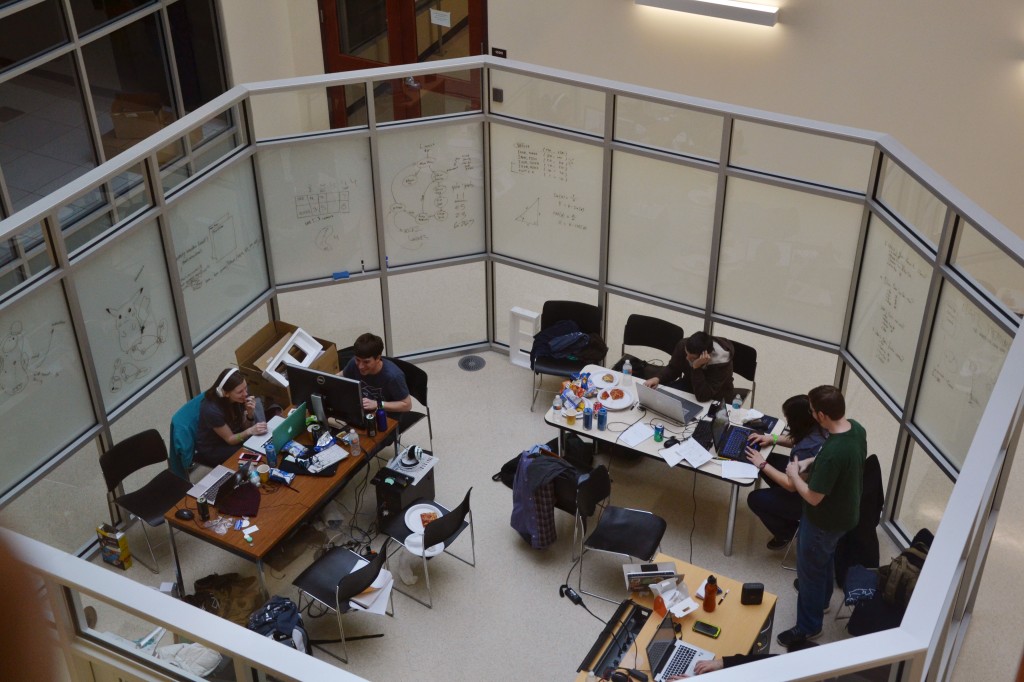
Hundreds of students stayed up late Friday and Saturday night, eating snacks and chugging caffeinated drinks. These night owls weren’t cramming for a test; they were competing in the second annual HackBU hackathon.
The event attracted 253 participants on 34 different teams to the Innovative Technologies Complex (ITC) this past weekend. Hacking — which according to Itai Ferber means hacking something together to bring a project to life— began at 8 p.m. on Friday and finished at 8 a.m. on Sunday.
Many went without sleep to use all the time given, and others took power naps under tables and on benches throughout the coding marathon. Although exhausted, participants said they pushed on because the experience was worthwhile.
“I’ve had a bunch of Monster, I haven’t slept and I’m not even sure what I’m doing anymore,” said Gus Kristiansen, a sophomore majoring in computer science. “But hopefully, a few hours from now, we’ll finish with something to be proud of.”
The event was organized by Binghamton University students and sponsored by seven companies, including TD Ameritrade and Pebble Technology Corporation, the makers of the Pebble Smartwatch. Major League Hacking (MLH), a company that hosts and facilitates hackathons, partnered with organizers to make the hackathon, and it provided hardware for the hackers to utilize, such as the virtual reality headset Oculus Rift and software resources like website domains. Student organizers were also available all weekend to offer tech support to participants.
Teams were competing for first, second and third place overall, as well as best use of Pebble technology and titles such as “Best Hardware Hack,” which was awarded to the team that created a flight simulator using Oculus Rift virtual reality hardware. First place winners received a Dell tablet, $100 of 3-D printing credit and a $100 restaurant gift card for a team dinner. For the Pebble category, each team member received a Pebble Time Steel watch. Winners of other categories received prizes ranging from 3-D printing credits to Google merchandise.
First place and the Pebble winner both went to BU students Toren DeRosa, Andrew White and Kristiansen, who created a version of Super Mario Bros. for the Pebble watch called Micro Mario.
“We wanted to make something that we would like to play,” said DeRosa, a junior majoring in computer science. “We were sleep deprived, but every time we decided to add a new feature it was still fun and an exciting step forward.”
Other projects included Bee Waga, a website that allows online tutors to interact with users, and D-Chat, an online video and text chat software that worked as an extension of Google Chrome and saved no chat history.
After stopping by first on Saturday and again Sunday morning to see the finished products, BU President Harvey Stenger said he was impressed with the participants’ creativity and skill levels, and the success of the program overall.
“Active learning is one of the best ways that students can gain new knowledge,” Stenger said. “There are few better examples of active learning than a hackathon where students are developing new ideas and working really hard in a limited amount of time. The learning that occurred in the last 36 hours is probably more than you can get out of an entire course over a semester.”
Ferber, a co-founder and organizer of HackBU, said he was happy with the sense of community the hackathon fostered.
“The most impressive part of this whole weekend was how many students decided to come out and hack with us,” said Ferber, a junior majoring in computer science. “The amount of students with all different levels of experience that came to try it out was great to see.”
Daniel O’Connor, the founder of HackBU and a BU alumnus who graduated last May, organized the first hackathon as a senior last year. This year, he returned to lend a hand and see how the event had grown. He said last year’s event, held in Academic A, was cramped and that the ITC was a much more suitable facility.
“It blows my mind,” O’Connor said. “Two years ago none of this was even feasible, this wasn’t an idea anybody could imagine happening. All it takes is one person that has free time and some sort of ambitious idea.”


